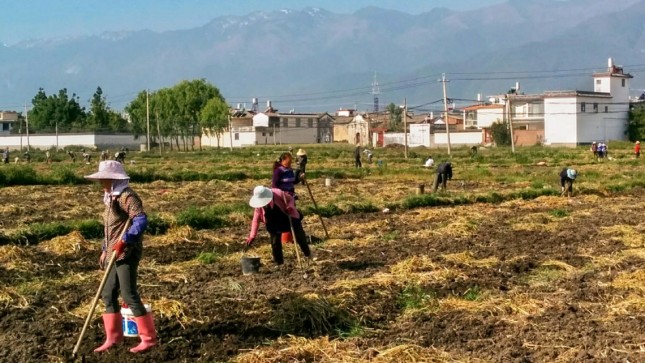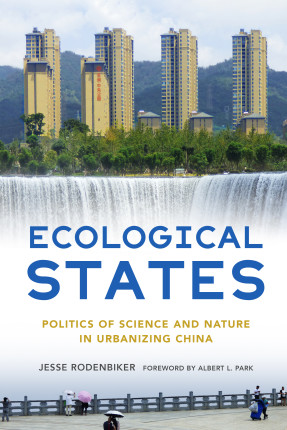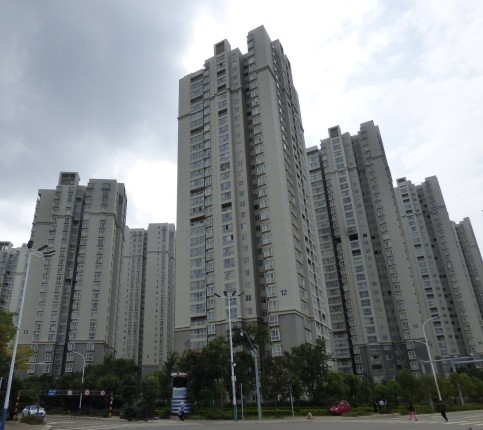-
China’s Ecological Migration from the Ground Up
June 15, 2023 By Jesse RodenbikerZhang Jian, a rural Chinese citizen living in the greater Kunming municipal region, readied himself for resettlement. After the state zoned his village for conservation, the next step for him and his rural comrades appeared to be resettlement into an urban high-rise apartment. Ecological migration is the official term used by the Chinese government for state-led processes of resettlement in the name of environmental protection. Journalists and researchers have predominantly focused on such resettlement programs in China’s west, particularly those related to grazing and anti-desertification campaigns. Less attention has been given to the ecological migrations occurring in China’s municipal regions, which are precipitating the movement of millions of rural landholders into, mainly, high-rise apartments.
Media accounts of displacement and resettlement tend to emphasize violent resistance and the significant economic and cultural effects of losing access to rural land in a socialist country where land is often the most valuable possession. While such accounts point to grim and sobering realities, they only capture part of the story of how everyday citizens creatively navigate Chinese environmental policies in pursuit of their own benefit.
Moving into Riches
Between 2014 and 2018, I travelled across China interviewing people who were facing relocation under state conservation policy. My freely available open-access book, Ecological States: Politics of Science and Nature in Urbanizing China, draws on this long-term fieldwork to examine how those facing ecological migration encounter and counter a Chinese state wielding ecology to govern.
Many citizens draw on China’s environmental policies to pursue upward socioeconomic mobility and livelihood transitions. Zhang Lin, for instance, is one example of villager turned urban landlord, striking a good deal for his rural land and housing. Instead of monetary compensation, the state awarded him multiple units in a high–rise resettlement complex. In his ecological migration, he transitioned from farming to being an urban landlord. In my interviews, ecological migrants like Zhang Lin referred to such ecological migration transitions as “moving into riches” (banfuyou). In contrast, however, many others failed to obtain favorable compensation for land and housing, and they characterized their ecological migration as moving into high-rise poverty.
Still others fell somewhere in between. Li Mei, for example, received a one-time payment for her land, which she invested in a rural land lease in another part of the municipal region. On her newly leased land, she began an aquaculture project drawing on her lifelong farming and fishing experience. Instead of simply moving into a high-rise resettlement apartment, she creatively used state ecological migration policies to pursue rural entrepreneurial endeavors. Further, she resisted state efforts to become part of the urban population by extending her agrarian roots into new sectors.
These brief examples expose some of the differentiated ways that everyday Chinese citizens navigate the political slipperiness of land and housing compensation. In my interviews across Chinese cities and rural counties, I found countless citizens who used ecological migration policies to pursue new livelihoods and socioeconomic improvement. While half of the book tells their stories, the other half sheds light on relationships between ecology and state power.
Ecology and the State
I argue in the book that ecology has become central to the constitution and expression of state power in China. The central state advances environmental policies aimed to synthesize practices across the country, such as ecological redlining and a national park system. Yet, local governments across administrative levels creatively implement environmental policies in ways that economically and politically benefit them.
Municipal governments, for instance, routinely draw on conservation policies to extend their reach over rural land in the greater municipal region. Municipal territorial extension in the name of environmental protection initiates ecological migration processes for millions of Chinese citizens — processes they must creatively navigate to reconstitute their own lives and livelihoods.
These dynamics undergird the uneven implementation of environmental policies across administrative levels and set the political terrain of negotiation between the Chinese state and society.
Jesse Rodenbiker is an associate research scholar at Princeton University with the Center on Contemporary China, a geography professor at Rutgers University, and a Wilson China fellow at the Wilson Center. He is the author of Ecological States: Politics of Science and Nature in Urbanizing China (2023, Cornell University Press) available as a free open-access e-book and in paperback.
Sources: Cornell University Press, Land Use Policy, National Science Review, New York Times.
Lead Photo Credit: Rural people in Southwest China whose land was classified for conservation now working as day laborers, courtesy of Jesse Rodenbiker.
Second Photo Credit: Book cover photo, courtesy of Cornell University Press.
Third Photo Credit: A high-rise resettlement complex in southwestern China in 2017, courtesy of Jesse Rodenbiker.
Topics: China Environment Forum
 A Publication of the Stimson Center.
A Publication of the Stimson Center.






